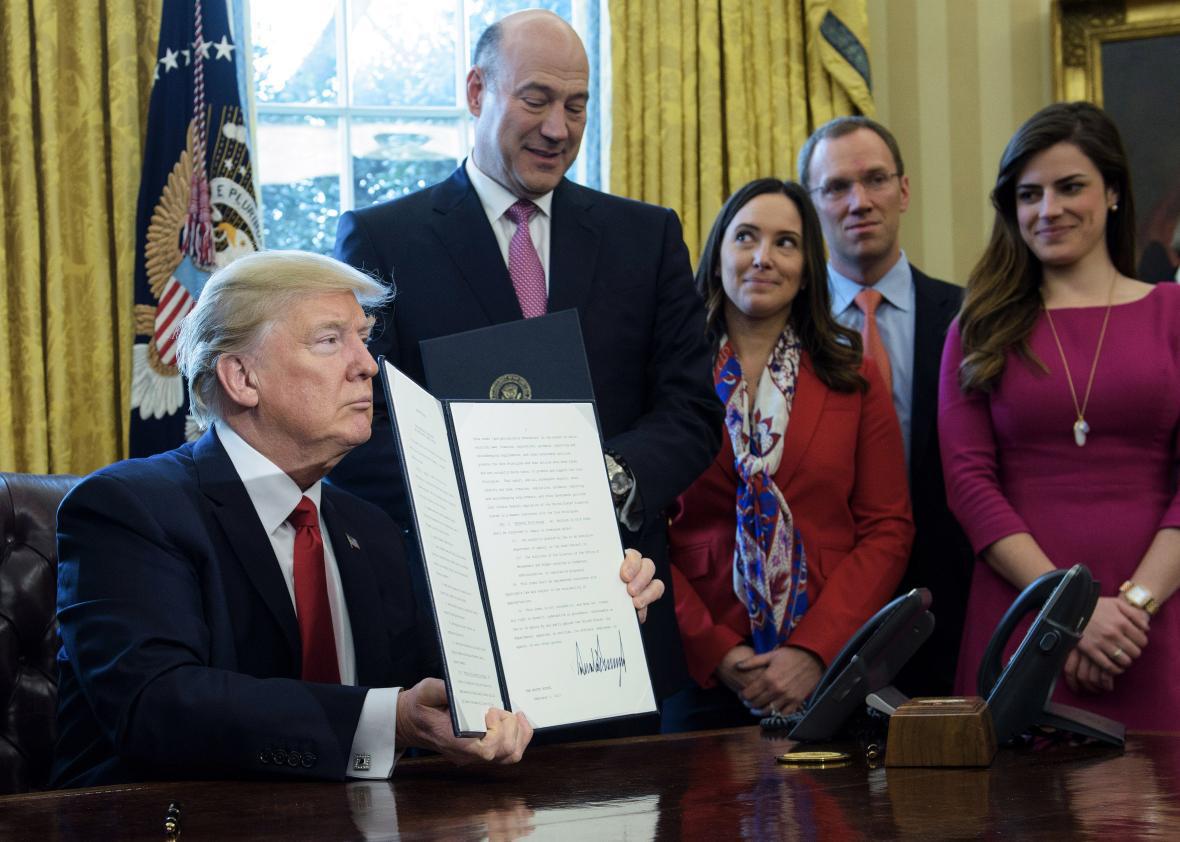The Trump era is, above all, a time of revelation.
This is true not only in the sense most alluring to his Christian fundamentalist supporters—that his presidency pushes the species closer to apocalypse—but also in a secular manner. Trump has, from the start, refused the obfuscations required to maintain American empire, and it’s here that we find his best historical precedent. Augustus and Tiberius were dedicated to Rome’s imperial doublespeak, paying lip service to the republic while ruling as emperors. Caligula had no time for their facades, making his horse consul less out of madness than—one revisionist biography argues—to demonstrate through satire that the consulship had grown so devoid of power that it hardly mattered if it was held by a man or mare; each would take the saddle. Trump’s rise was pure Caligulan theater, a true reality “show” fueled by heresies, the spoken-unspeakable: He mocked the Iraq war as a catastrophe during a Republican debate; bragged of paying the Clintons to attend his wedding; and finally spun his billion-dollar tax dodge into a sick new kind of credential.
But of all the dark American truths revealed by Trump, the most damning remains unremarked upon. It came when Wall Street greeted his presidency with the stock rally that now sees the Dow Jones above 20,000 for the first time in its history, an orgy of enrichment that has added more than a trillion dollars to the market’s value. This is a curious financial response to a man whose election was lawlessly aided by Russia, the same hostile power that, according to then–Treasury Secretary Hank Paulson, actively worked to torpedo our economy during the 2008 crash. It’s a curious response to a man whose refusal to disclose his private holdings would not be tolerated at any Wall Street bank. To a man who—with a nepotism that would horrify the shareholders of a public company—has appointed as his senior adviser for the Middle East his son-in-law, Jared Kushner, who publicly struggled with the considerably smaller task of simply not destroying a family real estate business.
How can American markets so cheer a man who poses such a clear threat to American society? Wall Street’s economists offer a tinker-toy explanation: American money is responding to anticipated cuts in corporate taxes, relaxed banking regulations, a slapdash federal stimulus program. And if Trump should be the agent of these changes, well, God works in mysterious ways. Barely sufficient within its parameters, their argument becomes damning when taken just one step beyond them. What can be said for elites who roar financial approval as Trump, triumphant, brags of abandoning America’s commitment to NATO, the bulwark of the postwar order that 60 million people died to create, and upon which all of America’s subsequent prosperity, from Levittown to Palo Alto, has been built? As he flouts the Constitution and all human decency with a Muslim ban that placed innocent families in handcuffs? As he rants about building his maniac border wall?
They have never been banner citizens. I saw the boom of the aughts firsthand while working at J.P. Morgan’s investment bank, watched the debt bomb of the 2008 crisis blithely constructed by one-dimensional business-school graduates who rarely questioned the market gospel that a hedge fund manager deserves his vast billions just as surely as a Malaysian sweatshop worker deserves her vast miseries. Beyond lamenting their diminished bonuses, most were unbothered by the destruction they had wrought and profited from; they don’t teach haunted self-examination at the Wharton School. But at least with the 2008 crisis there was deniability, the truth that most didn’t see it coming. Even to jaded eyes, Trump’s inaugural stock rally is a more disturbing phenomenon, bringing us to the grossest of Trumpian revelations—
Which is that American money is done pretending that its interests and those of American society are remotely aligned. The market’s silent hands have raised up a garish, glass-condo fifth column, filled with investors all cheering unfolding political catastrophe, because in the short term, it may tend to enrich them. The crowning theater piece came last week, when the heads of J.P. Morgan and Blackstone met with Trump, grinning gamely as he ordered the gutting of Dodd-Frank, the laws enacted after the 2008 crash to keep Wall Street from ever again bilking Americans into oblivion. Sitting with them was Ivanka, unelected, uncredentialed, her very presence an affront to democracy, her hair all honeyed-chestnut—almost as pretty as the mane of Caligula’s horse. But why object? They were getting what they wanted: another round of looting, fuel for the lives of glittery impunity which a hyperconsumerism holds as the ultimate good, even history’s grandest aim. There seems little hope for change; we’re having trouble just getting the new Goldman Sachs Treasury Secretary to disclose his offshore holdings.
But when the next crash comes, as it will, there will be no deniability, no question about who violated the social compact. Money’s one sacred text, the stock chart, will always tell how, like Roman senators seeking to enrich themselves by hailing Caligula, Late America’s aristocrats cheered their own mad emperor.
